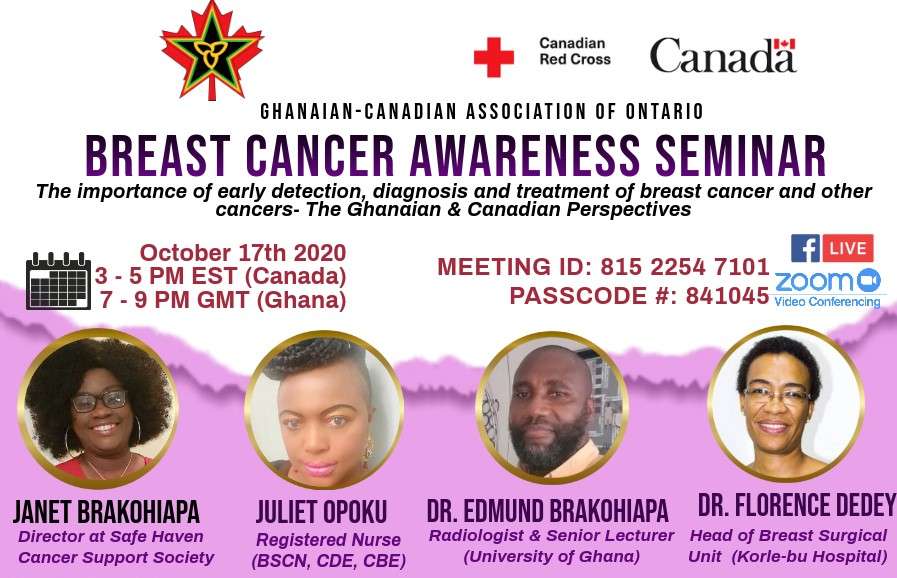
Breast Cancer Awareness Seminar (Report)
On October 17, 2020, the health education wing shared the importance of early detection, diagnosis and treatment of breast cancer and other cancer to the Ghanaian community. Over 60 participants from Ghana, United States and Canada joined the talk to learn and become aware of Breast Cancer. This seminar started with Janet Brakohiapa, Director of Safe Haven Cancer Support Society, who shared her experience as a cancer survivor and her late husband who died from the complication of cancer. Dr. Edmund Brakohiapa, Radiologist and Senior lecturer at the University of Ghana, then followed it. He described the different ways of diagnosing breast cancer through screening and diagnostic imaging and what they look out for. Dr. Florence Dedey, Korle-bu Hospital Head of Breast Surgical Unit went into details about the screening process and risk factors of breast cancer. Juliet Opoku, Registered Nurse shared about resources that are available here in Canada to help support families to obtain care early and treat cancer. She also talked about screening of breast cancer, risk factors and ways to manage and prevent cancer including chronic illness. She highlighted some cancers such as cervical cancer, and ovarian cancer with emphasis on taking advantage of the screening processes Canada provides for all Canadian.
Wealth of information was shared about breast cancer. It is amazing to know that breast cancer impacts a lot of women even at an early age (from 35+ years) and so it is important that it be detected early. The speakers addressed ways of diagnosing breast cancer, such as Mammogram, self-examination, ultra sound, biopsy, etc.
Early detection was addressed several times as the early you detect, the higher your survival rate. Cancer at stage 0 has 91% survival rate, at Stage 1 the survival rate is 87%, at Stage 2 it is 75% survival rate, at State 3 it decreases to 46% survival and finally at Stage 4 the chance of one surviving is 15%.
So, the earlier the cancer is detected, the greater the survival rate and the higher the chances for cure. Imaging picks up small cancer cells, so getting checked annually help identify cancer early. Dr. Brakohiapa used 25 cents coins to explain the size of stage 2 cancer and a penny representing the size of stage 1. Breast Cancer is the most common cancer that affect women worldwide. The incident in developing world is increasing as well as the number of deaths. At the different stages, the cancer size increases. Since early stage is important, it requires for less diagnostic test, less cost and less radical treatment. So for example, at stage 1, you can take out the lump and keep the breast whiles, if detected at a later stage; you may have to lose your breast.
Examining the breast continuously or regularly, helps increase your breast awareness. At least, check the breast once a month. When you are not sure of what you are feeling, go to your doctor to check. Its ok to hear there is nothing wrong than to wait to be told it is cancerous. There are various treatments depending on the stage of the cancer; it can be surgery, chemotherapy, radiation, etc. Exercising and eating healthy were identified as ways to prevent breast cancer. Unfortunately, for some people, it is genetic, meaning, a female relative from either side of the family may have had it, as a result their chances of getting it is higher. Knowing your family history is very important as this can help you start observing the body often.
There are many misconceptions when it comes to breast cancer. Some people think the cutting of the breast will lead them to die. Some have fear of what the cancer will do to them. How they will relate with their spouse, the fear of losing something. Financial constraint is another, at times, we associate spiritual cause, and as a result, they tend to seek spiritual care instead of actual medical care. The spiritual support is very necessary but the treatment is associated with medical care. The health care system also plays an impact, which is the delay at the health system, the attitude of staff, etc., this leads to poor outcomes. However, let us not be weary about the system, fear and misconceptions. It is important we seek care early and be compliant with the treatment that is required. If you identify changes to the breast, seek care immediately.
GCAO is very grateful for the support of our speakers. Participants were very engaged and had questions to expand their understanding of the cancer. The men in the group expressed an interest in prostate cancer and so we hope to have another session on prostate cancer soon.
Published by Mary Akuamoah-Boateng


